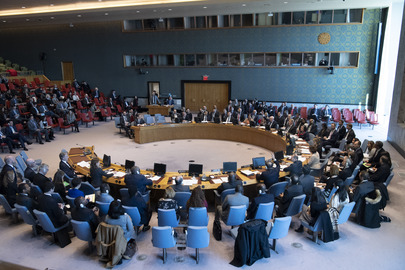It’s official: January was the warmest on record
The world has just experienced the hottest January ever recorded, the World Meteorological Organization (WMO) said on Thursday, citing data crunched by UN partner the Copernicus Climate Service.
Last month was 1.75 degrees Celsius above the pre-industrial level and 0.79°C above the 1991-2020 average – despite expectations that the La Nina weather phenomenon might bring cooler temperatures.
In 2015, the international community agreed to try to limit average global temperature rise to 1.5°C above pre-industrial levels.
The January data was “surprising” even to climate change experts at Copernicus – the European climate change service – which noted that it was the 18th month in the last 19 where surface air temperatures globally were more than 1.5°C above the pre-industrial level.
Gaza: 10,000 aid trucks reached enclave since ceasefire began
The humanitarian community’s plan to flood Gaza with lifesaving aid passed an important milestone on Thursday with the news that more than 10,000 relief lorries have entered the enclave since the ceasefire began on 19 January.
Announcing the development, the UN’s top aid official, Tom Fletcher, said that the trucks contained lifesaving food, medicine, and tents – all desperately needed by Gazans after more than 15 months of constant Israeli bombardment.
The UN emergency relief chief’s comments came as he prepared to join an aid convoy crossing into northern Gaza.
In recent days, he has held “practical discussions” with the Israeli authorities in Tel Aviv and Jerusalem “to keep lifesaving UN aid moving into Gaza at scale”. This includes COGAT – the Israeli body responsible for approving requests to deliver aid into Gaza and the West Bank – and the Israel Foreign Ministry.
Female genital mutilation continues to harm millions: UN agencies
A staggering 230 million girls and women alive today carry the lifelong physical, emotional and psychological scars of female genital mutilation – FGM – and another 27 million are in immediate danger of being cut in the next five years – the UN warned on Thursday – the International Day of Zero Tolerance for Female Genital Mutilation.
Three UN agencies – UNFPA, UNICEF and WHO – said that progress on ending FGM remains fragile and that each year, over two million girls are cut before their fifth birthday.
Here’s Christina Pallitto, Technical Lead on FGM from the World Health Organization:
“It violates the rights, and it harms their health. It is estimated that it costs health systems $1.4 billion per year to treat the health complications of FGM… Today is the International Day of Zero tolerance for FGM. It is an opportunity for us all to renew our commitments to work together across sectors to end this practice once and for all.”
The UN’s continued efforts to end this harmful practice come amid ongoing attempts by The Gambia to repeal the ban on female genital mutilation.
“It is starkly evident that the tireless work and achievements over decades is in threat of jeopardy by such efforts”, the UN agencies said.
Out of 31 countries where FGM happens, only seven are on track to meet the goal of ending cutting by 2030.
Daniel Johnson, UN News
Don’t forget that you can hear more news and interviews on the UN News website and audio hub now.
Music composed and produced by Joachim Harris. All rights reserved
Source of original article: United Nations (news.un.org). Photo credit: UN. The content of this article does not necessarily reflect the views or opinion of Global Diaspora News (www.globaldiasporanews.com).
To submit your press release: (https://www.globaldiasporanews.com/pr).
To advertise on Global Diaspora News: (www.globaldiasporanews.com/ads).
Sign up to Global Diaspora News newsletter (https://www.globaldiasporanews.com/newsletter/) to start receiving updates and opportunities directly in your email inbox for free.



























